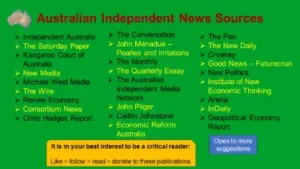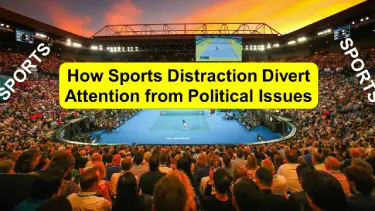Description:
Sports distraction. Discover how sports promotion in Australia diverts attention from crucial political issues and learn how to stay informed.
Introduction: The Power of Sports Distraction
In Australia, sports are more than just games; they’re a national obsession. However, beneath the surface of this cultural phenomenon lies a significant issue: the strategic use of sports by corporations and politicians to divert public attention from pressing political and social matters. This manipulation is not just coincidental but a calculated effort to keep citizens focused on the thrill of the game rather than the policies that shape their lives.
The consequences of this distraction are far-reaching. While Australians are engrossed in sports, vital issues such as healthcare, economic inequality, and environmental degradation are sidelined. The media, often complicit in this distraction, floods the airwaves with sports coverage, leaving little room for the critical discussions necessary for a healthy democracy. As a result, the public’s ability to hold politicians and corporations accountable is weakened.
To reclaim their focus, citizens must recognize this manipulation and actively engage in political discourse. By understanding the mechanisms of distraction and adopting strategies to stay informed, Australians can ensure that their voices are heard, and their concerns addressed.
1. The Intersection of Sports, Corporations, and Politics
Corporate Interests in Sports
 Corporations have long recognized the power of sports as a vehicle for brand promotion. Sponsorship deals, advertising during major sporting events, and branding stadiums with corporate logos are all part of a strategy to embed their names in the public’s consciousness. For example, companies like Coca-Cola and McDonald’s have become synonymous with the Olympic Games, using these events to enhance their brand visibility globally.
Corporations have long recognized the power of sports as a vehicle for brand promotion. Sponsorship deals, advertising during major sporting events, and branding stadiums with corporate logos are all part of a strategy to embed their names in the public’s consciousness. For example, companies like Coca-Cola and McDonald’s have become synonymous with the Olympic Games, using these events to enhance their brand visibility globally.
However, this relationship between sports and corporations goes beyond mere advertising. By associating their brands with the positive emotion’s sports evoke—such as pride, excitement, and unity—corporations create a bond with consumers that transcends traditional marketing. This bond often results in increased consumer loyalty and a more favourable public image, which in turn leads to greater profits.
Political Exploitation of Sports
Politicians, too, have tapped into the cultural significance of sports to further their agendas. By aligning themselves with popular sports teams or events, they try to bolster their public image and connect with voters on an emotional level. This tactic is particularly effective in Australia, where sports are deeply woven into the national identity.
For instance, during election seasons, it’s common to see politicians attending major sporting events, donning team colours, and making public appearances alongside star athletes. These actions are designed to generate positive media coverage and distract from more controversial political issues. In some cases, politicians have even used major sports events as a platform to announce policies or divert attention from scandals, effectively using sports as a shield against political fallout.
2. The Impact of Sports Promotion on Public Focus
Media Saturation and Public Distraction
The media plays a crucial role in amplifying the focus on sports, often at the expense of critical political coverage. In Australia, sports distraction coverage dominates television schedules, online news platforms, and social media feeds. The result is a saturated media landscape where sports news overshadows political reporting, reducing the public’s exposure to critical issues.
This saturation has a numbing effect on public discourse. When sports news is constantly at the forefront, it becomes challenging for citizens to engage with more complex and pressing matters such as climate change policies or economic reforms. Moreover, the emotional intensity of sports can create a form of escapism, where fans become so absorbed in their teams’ successes and failures that they disengage from political and social responsibilities.
Psychological Effects of Sports Obsession
The psychological impact of sports obsession should not be underestimated. Sports fandom often involves a deep emotional investment, where fans experience joy, frustration, and even despair based on their team’s performance. This emotional rollercoaster can serve as a powerful distraction, drawing attention away from the more sobering realities of political life.
Research shows that this kind of emotional engagement can reduce cognitive engagement with other topics, including politics. When fans are preoccupied with sports, they may be less likely to take part in political discussions, attend community meetings, or vote in elections. Over time, this disengagement can lead to a less informed and less active electorate, weakening the democratic process.
3. The Cost of Sports Distraction: Ignored Political Issues
Neglected Social Justice Issues
 One of the most significant costs of sports distraction is the neglect of social justice issues. In a country where housing affordability, healthcare access, and educational inequality are pressing concerns, the public’s focus on sports can detract from the necessary debates and actions needed to address these challenges. For example, while media outlets extensively covered the recent cricket season, stories about the growing homelessness crisis in Australian cities received far less attention.
One of the most significant costs of sports distraction is the neglect of social justice issues. In a country where housing affordability, healthcare access, and educational inequality are pressing concerns, the public’s focus on sports can detract from the necessary debates and actions needed to address these challenges. For example, while media outlets extensively covered the recent cricket season, stories about the growing homelessness crisis in Australian cities received far less attention.
This imbalance in coverage allows policymakers to avoid scrutiny and delays necessary reforms. Without sustained public pressure, issues like income inequality, workers’ rights, and Indigenous rights are often sidelined, leading to slower progress and deeper societal divisions.
Economic Policies and Public Welfare

Economic policies, particularly those related to neoliberal reforms, are another area that suffers from a lack of public scrutiny due to sports distractions. As politicians push for privatization, deregulation, and cuts to public services, the media’s focus on sports can obscure the long-term impacts of these policies on public welfare.
For instance, during the COVID-19 pandemic, there were significant changes to social security measures, including adjustments to the Jobseeker Payment and Youth Allowance income tests. These changes allowed recipients to earn more income before their payments were reduced, but these adjustments were made quietly amidst broader public focus on pandemic-related news and events, including major sports events. Such timing often minimizes public scrutiny and debate on the implications of these policies, particularly for low-income families who are directly affected by these changes.
The consequences of these policies often go unnoticed until they begin to affect citizens directly, at which point it may be too late to reverse the damage. By the time public attention shifts back to these issues, the opportunity for meaningful debate and intervention may have passed.
Environmental Concerns
Environmental issues, particularly those related to climate change, are also overshadowed by the focus on sports. Despite Australia’s vulnerability to climate change impacts—such as bushfires, droughts, and rising sea levels—sports events often receive more coverage than environmental policies or scientific reports. This lack of attention can slow the implementation of necessary environmental regulations and policies, putting future generations at risk.
For example, during the 2020 Australian Open, while much of the country was reeling from devastating bushfires, the media coverage focused on the tournament rather than the broader environmental crisis. This prioritization of sports over environmental concerns reflects a broader trend where entertainment takes precedence over critical issues, to the detriment of public awareness and action.
4. Strategies to Maintain Focus on Important Issues
Promoting Media Literacy
 To counter the distraction posed by sports, it is crucial to promote media literacy among citizens. Media literacy involves the ability to critically analyse media content, recognize biases, and identify attempts at manipulation. By developing these skills, individuals can become more discerning consumers of media and less susceptible to distractions.
To counter the distraction posed by sports, it is crucial to promote media literacy among citizens. Media literacy involves the ability to critically analyse media content, recognize biases, and identify attempts at manipulation. By developing these skills, individuals can become more discerning consumers of media and less susceptible to distractions.
Educational programs, community workshops, and online resources can play a vital role in enhancing media literacy. Citizens who are equipped with these skills are better able to distinguish between important news and distractions, ensuring that they are still focused on the issues that truly matter.
Balancing Sports with Civic Engagement
While it is possible to enjoy sports without falling prey to distraction, it requires conscious effort to balance fandom with civic responsibilities. Fans can continue to support their teams while also staying informed about political and social issues. This balance can be achieved by setting aside time to read the news, take part in community activities, and engage in discussions about current events.
One practical approach is to integrate political engagement into daily routines. For example, sports fans could commit to reading a political news article or listening to a podcast about current events before or after watching a game. This habit ensures that sports enjoyment does not come at the expense of staying informed and engaged.
Grassroots Movements and Citizen Advocacy
Grassroots movements and citizen advocacy are powerful tools for refocusing public attention on critical issues. These movements often appear in response to perceived injustices or neglected issues, mobilizing citizens to act. By taking part in or supporting these movements, individuals can contribute to a broader effort to hold politicians and corporations accountable.
Successful grassroots campaigns in Australia, such as those advocating for climate action or Indigenous rights, show the impact that organized citizen efforts can have. These movements not only raise awareness of critical issues but also pressure policymakers to enact meaningful change.
5. The Role of Alternative Media and Independent Journalism
Supporting Independent Media Outlets
Independent media outlets play a crucial role in covering stories that mainstream media may overlook, particularly those related to political and social issues. By supporting these outlets—whether through subscriptions, donations, or sharing their content—citizens can help ensure that important stories receive the attention they deserve.
outlets play a crucial role in covering stories that mainstream media may overlook, particularly those related to political and social issues. By supporting these outlets—whether through subscriptions, donations, or sharing their content—citizens can help ensure that important stories receive the attention they deserve.
In Australia, independent media organizations such as Crikey and The Saturday Paper provide in-depth analysis and investigative reporting on issues that may not receive adequate coverage in mainstream outlets. These sources offer a valuable alternative to the sports-dominated media landscape, helping to keep citizens informed about the issues that matter most.
Creating and Sharing Content Focused on Political Awareness
Citizens can also contribute to the public discourse by creating and sharing content that focuses on political and social issues. Whether through blogs, social media posts, or community newsletters, individuals have the power to shape the conversation and bring attention to neglected topics. By sharing articles, videos, and other content that highlights critical issues, citizens can counterbalance the overwhelming focus on sports in the media.
Moreover, by engaging with others in discussions about these issues, individuals can foster a more informed and active community. Social media platforms offer a powerful tool for amplifying voices and connecting with like-minded individuals who are committed to staying informed and engaged.
6. Conclusion
Recap of Key Points
The heavy promotion of sports distraction by corporations and politicians in Australia serves as a significant distraction from critical political and social issues. This distraction is perpetuated by media saturation, emotional engagement with sports, and the sidelining of important topics. However, by promoting media literacy, balancing sports with civic engagement, supporting grassroots movements, and backing independent journalism, citizens can reclaim their focus and ensure that their voices are heard.
Call to Action
As you enjoy the next big game, take a moment to consider the issues that matter most to you. Stay informed, engage in discussions, and support the efforts to bring attention to the critical matters that shape our society. Your voice can make a difference.
Reader Interaction
What do you think are the most important political issues currently being overshadowed by sports in Australia? Share your thoughts in the comments below!
Social Sharing
If you found this article insightful, please share it on your social media platforms to help spread awareness about the importance of staying focused on critical issues.
References:
The distraction effect. Political and entertainment-oriented content on
social media, political participation, interest, and knowledge: https://www.sciencedirect.com/science/article/pii/S0747563222004642/pdfft?md5=9c90ed3a838547f67b0442560763c196&pid=1-s2.0-S0747563222004642-main.pdf


Another excellent article.
The media certainly saturates the press and the politicians (some not honestly – eg Scotty and the Sharkies) align themselves with a team local to their constituency.
There is an issue with Independent media and that is their paywall structure. I share many articles on FB, however very few friends acknowledge these articles, due to the paywalls mainly, but I figure some can’t be bothered to read them sadly. Pearls and Irritations don’t seem to have a paywall, but Crikey and the Saturday Paper do.
Hi Janet,
Thank you for your comment. Yes, some Independent media do have a paywall such as the ones you mention, but there are others like Michael West Media, Independent Media, The Conversation, The Australian Institute, and Pearles and Irriations to name a few that are excellent and free. I do my best to include some of these as links in my articles. Any, thank you again for your support.